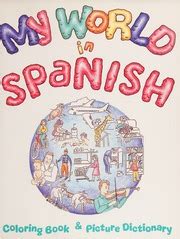¡Hola! Are you ready to explore the world in Spanish? Learning a new language can be a fascinating and rewarding experience, especially when it comes to a language as rich and diverse as Spanish. From the beautiful beaches of Spain to the vibrant cities of Latin America, Spanish is an essential tool for anyone looking to connect with the Hispanic culture.
In this article, we will delve into the world of Spanish, exploring its history, grammar, and cultural significance. Whether you are a beginner or an advanced learner, we will provide you with the necessary tools and resources to improve your language skills and explore the many wonders of the Spanish-speaking world.
The History of Spanish
Spanish is a Romance language that originated in the Iberian Peninsula, specifically in the kingdoms of Castile and León. It evolved from Latin, the language spoken by the Romans, and was influenced by various languages such as Arabic, Germanic, and indigenous languages.

Over time, Spanish spread throughout the world, becoming the official language of many countries in Central and South America, as well as the Caribbean. Today, Spanish is the second most widely spoken language in the world, with over 460 million native speakers.
Spanish Grammar and Pronunciation
Spanish grammar and pronunciation can be challenging for non-native speakers, but with practice and dedication, anyone can master the language.
One of the most distinctive features of Spanish is its pronunciation, which is known for its melodic intonation and use of accents. Spanish also has a complex grammar system, with many verb conjugations and tenses.

Some of the key aspects of Spanish grammar include:
- Verb conjugation: Spanish verbs change their ending depending on the subject pronoun and tense.
- Tenses: Spanish has several tenses, including the present, preterite, imperfect, and future.
- Subjunctive mood: Spanish uses the subjunctive mood to express doubt, uncertainty, or possibility.
Common Spanish Phrases and Vocabulary
Learning common Spanish phrases and vocabulary is essential for any language learner. Here are some basic phrases to get you started:
- Hello: Hola (OH-lah)
- Goodbye: Adiós (ah-DEE-yos)
- Thank you: Gracias (GRAH-see-ahs)
- Yes: Sí (SEE)
- No: No (noh)

Some common vocabulary words include:
- Food: comida (koh-MEE-dah)
- Drink: bebida (beh-BEE-dah)
- Hotel: hotel (oh-TEH-l)
- Restaurant: restaurante (reh-stoh-RAHN-tay)
Exploring Spanish Culture
Spanish culture is rich and diverse, with a wide range of traditions, customs, and festivals. From the beautiful art of Gaudí to the vibrant music of flamenco, Spanish culture has something to offer for everyone.

Some of the most popular Spanish festivals and celebrations include:
- La Tomatina: a tomato-throwing festival in Buñol, Spain
- Las Fallas: a festival of fireworks and bonfires in Valencia, Spain
- Dia de los Muertos: a celebration of the dead in Mexico and other Latin American countries
Spanish Literature and Film
Spanish literature and film have made significant contributions to world culture, with famous authors such as Cervantes, Lorca, and García Márquez.

Some of the most famous Spanish films include:
- "Pan's Labyrinth" by Guillermo del Toro
- "Volver" by Pedro Almodóvar
- "Ocho apellidos vascos" by Emilio Martínez-Lázaro






Why is Spanish a valuable language to learn?
+Spanish is a valuable language to learn because it is the second most widely spoken language in the world, with over 460 million native speakers. It is also the official language of many countries in Central and South America, as well as the Caribbean. Learning Spanish can open up many career opportunities and cultural experiences.
How difficult is it to learn Spanish?
+Spanish can be a challenging language to learn, but with practice and dedication, anyone can master it. Spanish grammar and pronunciation can be complex, but there are many resources available to help learners, such as language courses, apps, and language exchange programs.
What are some common Spanish phrases and vocabulary words?
+Some common Spanish phrases include "hola" (hello), "adiós" (goodbye), "gracias" (thank you), and "¿cómo estás?" (how are you?). Some common vocabulary words include "comida" (food), "bebida" (drink), "hotel" (hotel), and "restaurante" (restaurant).
We hope you have enjoyed this journey through the world of Spanish. Whether you are a beginner or an advanced learner, we encourage you to continue exploring the many wonders of the Spanish-speaking world. ¡Buena suerte! (Good luck!)
